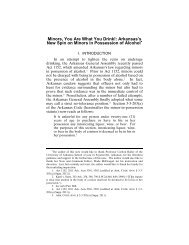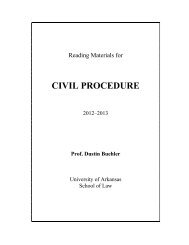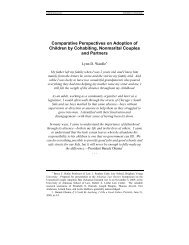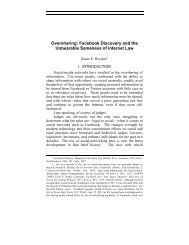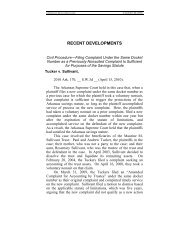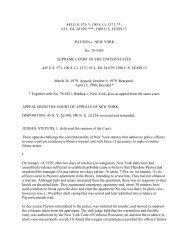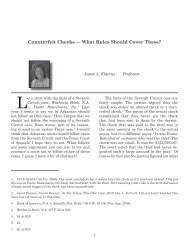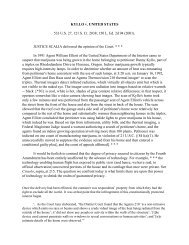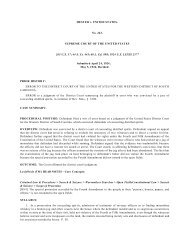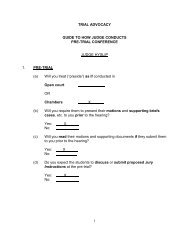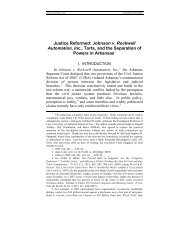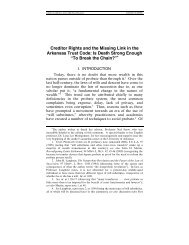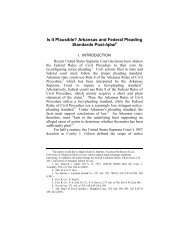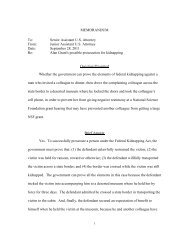TA-Syllabus - School of Law - University of Arkansas
TA-Syllabus - School of Law - University of Arkansas
TA-Syllabus - School of Law - University of Arkansas
You also want an ePaper? Increase the reach of your titles
YUMPU automatically turns print PDFs into web optimized ePapers that Google loves.
applicable in NI<strong>TA</strong>. You should be thoroughly familiar with the rules affecting trial and<br />
pretrial procedures, and especially the rules dealing with depositions.<br />
United States Supreme Court Opinions -Constitutional Criminal Procedure should be<br />
consulted as the need warrants!<br />
5. All classroom participation assignments and the Big Trial follow the Federal Rules <strong>of</strong><br />
Evidence.<br />
6. Unless otherwise indicated, assume that the only available witnesses who can give<br />
admissible testimony are those disclosed in the file materials distributed with the<br />
assignment. If you wish to use other testimony, which you consider would surely be<br />
available in such a case as the one on trial, ask the instructor before the class meeting for<br />
permission to assume the availability <strong>of</strong> such testimony.<br />
7. All students, whether called on to participate in an oral presentation as counsel or not, may<br />
be asked during a subsequent class how he/she would have handled some particular aspect<br />
<strong>of</strong> an exercise. The student questioned in this manner must answer orally or as otherwise<br />
instructed regarding the following issues: (1) the theory <strong>of</strong> the client's case (its strength and<br />
weakness); (2) the objectives in that phase <strong>of</strong> trial and how those objectives relate to the<br />
theory <strong>of</strong> the case (overall plan for trial); (3) any risks in the case, and (4) the applicable<br />
[Federal Rules <strong>of</strong> Evidence].<br />
8. Assume that all parties have been given due notice <strong>of</strong> the taking <strong>of</strong> any deposition that<br />
appears in the course materials.<br />
9. At times, for tactical reasons, a student may decide not to make a valid objection to<br />
evidence. In all such instances, the student should make a note immediately and be<br />
prepared to state during the instructor's evaluation <strong>of</strong> that performance why valid objections<br />
were not made. Moreover, after the class assignment, the student should give a copy <strong>of</strong><br />
his/her "non-objections" to the instructor.<br />
10. Conversely, at times a student may make a legally valid objection in carrying out his/her<br />
theory that he/she later regards as tactically unwise. The student should be prepared during<br />
a subsequent class or critique session to indicate such occasions with reasons for believing<br />
them tactically unwise.<br />
11. In some assignments, counsel may decide that the tactically correct examination would be<br />
short or nonexistent. Even so, a student may wish to conduct a longer examination in order<br />
to gain experience. That student should indicate this desire by a note to the instructor. If<br />
time allows, the instructor may then permit the student to conduct the longer examination.<br />
12. To conserve time for critique, the trial judge may interrupt proceedings during any student<br />
presentation and instruct counsel to summarize one or more elements <strong>of</strong> the planned<br />
examination. In that event, the instructor may also call on opposing counsel to indicate what<br />
objections, if any, she would have made.<br />
12



